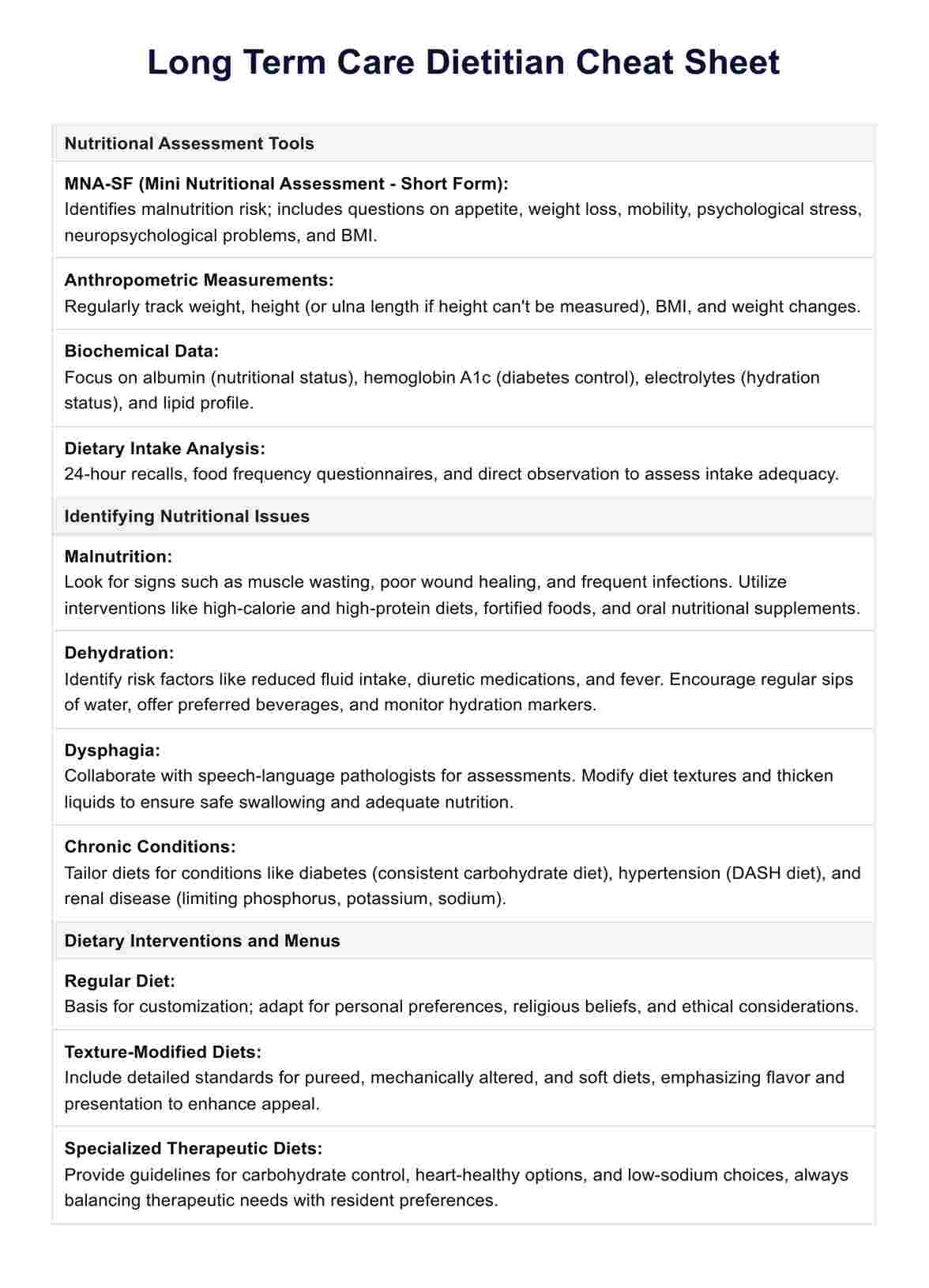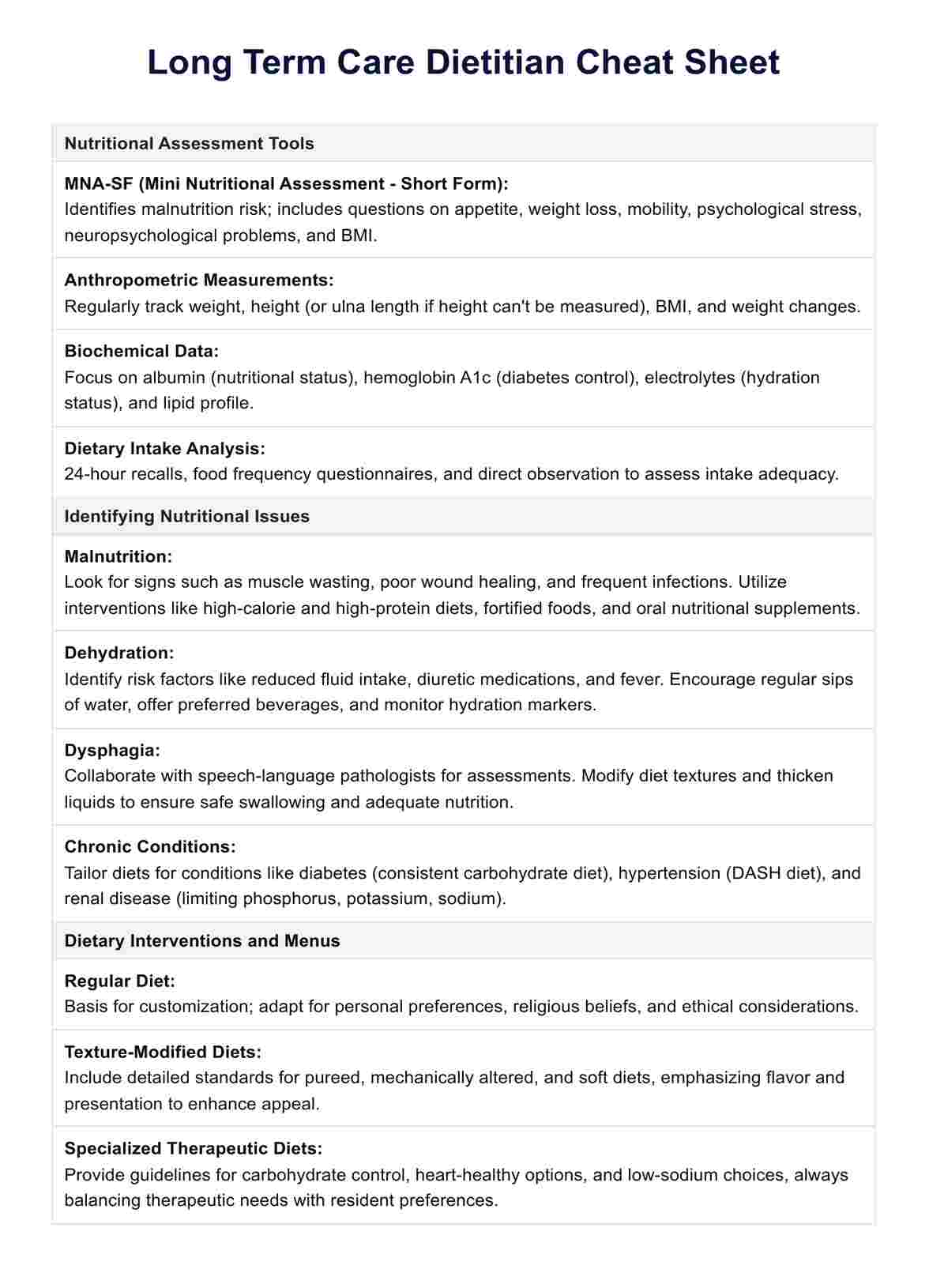
Discover how a Long-Term Care Dietitian Cheat Sheet can streamline nutritional management to ensure personalized and efficient dietary planning for patients.

By Russell Tan on Aug 11, 2024.


Long-term care encompasses a variety of services designed to meet a person's health or personal care needs during a short or long period. It's aimed at helping people live as independently and safely as possible when they can no longer perform everyday activities independently.
Long-term care can include medical and non-medical care for individuals with chronic illnesses or disabilities, and it can be provided in various settings, such as acute care, home, community facilities, or long-term care facilities like nursing homes.
To acquire knowledge on comprehensive resources and templates designed to support long-term care professionals, including those transitioning from acute care, check out our Nutrition Intake Form and Intake Form. These tools help healthcare providers and nutritionists assess overall health, identify nutritional needs, and develop personalized plans.
PDF Template Example PDF

Long-term patients are individuals who require ongoing care for an extended period, typically due to chronic illnesses, disabilities, or the aging process. These patients may have conditions that limit their ability to perform daily activities such as bathing, dressing, eating, and managing medications.
Long-term patients can be of any age, but the need for long-term care is more common among older adults. The care they require is focused on medical services, supporting their daily living, and ensuring their quality of life. This spectrum also includes those transitioning from acute care to permanent long-term solutions.
Diet plays a crucial role in long-term care patients' overall well-being. It's not just about providing nutrition; it's about enhancing the quality of life, managing chronic conditions, and promoting healing and well-being. A well-balanced diet can help maintain an optimal weight, stabilize body systems, and reduce the risk of chronic diseases.
Moreover, proper nutrition can aid recovery, improve immune function, and enhance mental well-being. The importance of a tailored diet cannot be overstated for individuals in long-term care, where the body might already be weakened by illness or age. This is especially important for patients who are coming from acute care environments.
When planning diets for different patient populations in long-term care, several considerations come into play to address their unique nutritional needs and preferences:
By considering these considerations, caregivers and healthcare providers can create diet plans that support the health and happiness of patients in long-term care, contributing significantly to their care and quality of life.
Our long-term care cheat sheet is a concise, comprehensive guide designed to provide quick reference information for your caregiver, registered dietitian, or healthcare professional working in long-term care settings. While the specific contents can vary, typical long-term care cheat sheets might include:
Our Long-term Care Dietitian Cheat Sheet template is designed to streamline long-term care settings' nutritional management and care planning process. It facilitates efficient assessment and monitoring of residents' dietary needs, accounting for all the calculations required for optimal nutritional support. Here's how to utilize this valuable tool:
Begin by downloading the Long-term Care Dietitian Cheat Sheet template. It's free in various formats, allowing you to choose the best option for your needs—digital for electronic records or printable for physical documentation. Ensure you have compatible software to open and edit the template for digital use.
Dedicate time to customize the cheat sheet based on your residents' specific dietary needs, preferences, and medical conditions. The template features sections for inputting critical information such as dietary restrictions, nutritional goals, and special instructions. This customization facilitates personalized care for each resident.
Incorporate the completed cheat sheet into your daily routine. Use it as a quick reference during meal planning, nutritional assessments, and interdisciplinary team meetings. It ensures all team members know and can accommodate each resident's unique nutritional requirements.
Keep the cheat sheet up-to-date with residents' dietary needs, preferences, or health status changes. Regular updates ensure the cheat sheet remains reliable for managing and providing high-quality nutritional care.
The cheat sheets offer several key benefits for dietitians working in long-term care facilities, enhancing both efficiency and the quality of patient care: